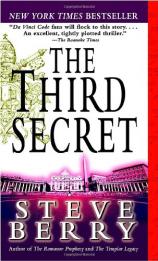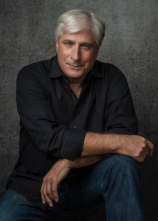Interview: May 20, 2005
May 20, 2005
Bookreporter.com's Suspense/Thriller Author Spotlight Team (Carol Fitzgerald, Joe Hartlaub and Wiley Saichek) interviewed Steve Berry, author of THE THIRD SECRET. Berry addresses the coincidence of events surrounding the publication of his latest novel and how he hopes the public will react to the book, especially considering the recent death of Pope John Paul II and the election of a new pontiff. He describes his fascination for writing about the "greater mysteries" of world history, explains how he conducts research for his novels (which is an ongoing process), and shares with readers details about his future projects.
Bookreporter.com: We were struck by the coincidence of events surrounding the publication of THE THIRD SECRET. The book was written in 1998, received numerous rejections and ultimately was purchased in 2003. The publication date of May 2005 was scheduled in 2004. As it releases, there is a new Pope --- Pope Benedict XVI --- who, like Pope Clement XV in THE THIRD SECRET, is German. Lucia dos Santos, the last of the shepherd girls at Fatima, passed away a few months ago. The last Pope Benedict commissioned the investigation of the appearances of Our Lady of Fatima, which THE THIRD SECRET explores. There are reports of appearances of images of the Blessed Mother on surfaces such as the sides of tunnels in various areas of the world. These occurrences were not foreseen when THE THIRD SECRET was scheduled for publication. Have you considered the possibility --- even for a moment --- that the timing of all this might be divinely inspired?
Steve Berry: You never know, maybe. Benedict XVI is now pope. In THE THIRD SECRET my pope is named Clement XV. Both men are German, in their seventies, a product of the Vatican (having held high office in the curia), elected quickly after a long pontificate as a transitional pope, who face monumental issues of great importance to the Church. Also, all of the hot button issues that have been widely discussed over the past few weeks concerning the Church in the modern world, and the challenges the new pope will face, are in THE THIRD SECRET, along with a shocking revelation that literally changes everything. It's certainly interesting, the similarities, particularly since the idea for THE THIRD SECRET was conceived six years ago and, as you noted, the manuscript was submitted to Ballantine Books over a year ago. But as like politics, in publishing timing is everything too. I have another theory, though. I dedicated this book to a favorite aunt who died in 1992. She thought of me as her son and would have been so proud of all this. She's surely watching and smiling, so maybe the thanks goes to her.
BRC: Was there specific inspiration for the characters of Colin Michener and Katerina?
SB: Not the characters per se, but Colin's last name was inspired by my favorite writer, James Michener. HAWAII was the first adult novel I ever read (when I was 15) and the story enthralled me. I became a great fan and have a nearly complete first edition collection of Michener's works. Michener had just died when I started plotting THE THIRD SECRET in the late 1990s, so I named the character after him in tribute.
BRC: What inspired Romania as one of the settings for THE THIRD SECRET?
SB: I've always been fascinated by the place. Lots of mystery associated with its history and culture. So when I was deciding on locales, that one seemed a natural.
BRC: We were impressed with your knowledge and understanding of church history, which runs deeply throughout THE THIRD SECRET. You mention in another interview that you were raised as a Catholic and attended Catholic school. Did you ever study for the priesthood, or consider a religious vocation?
SB: My mother says that when I was 7 or 8 I'd often say that I wanted to be a priest, but I don't recall. I did attend Catholic school and learned my catechism. Ever since, I've possessed a life-long interest in the Catholic Church and have become a student of the institution.
BRC: Are you a practicing Catholic at this time?
SB: Not much any more.
BRC: Are you concerned about public reaction to THE THIRD SECRET, especially with the recent death of Pope John Paul II and the election of a new pope?
SB: Hopefully, readers will remember that this is a novel and the primary goal of a novel is to entertain. The plot is from my imagination. I just want the reader to enjoy themselves for a few hours and, if the plot gets them thinking and talking, then so much the better.
BRC: Given the conservative nature of the Church, were you pushing the envelope a bit with your news about the four parts of the secret? Were you editorializing your own wishes?
SB: Not at all. My Clement, like the current Benedict XVI, was supposed to be a transitional pope, an older man placed on the throne of St. Peter simply to keep the chair warm until one of the younger cardinals could muster enough votes to get himself elected. But, like John XXIII, who was also supposed to be a caretaker pope, Clement starts to change everything, and this brings out opponents, especially Cardinal Valendrea, who detests anything that varies from the established order. This very conflict exists within the Church today. Liberals and conservatives are battling for control and that theological war is graphically illustrated in this novel, with an added twist from a surprising third player, which makes the conflict that much more interesting. I've always been intrigued by the line that separates religion and faith. There's a distinct difference between those two concepts and this book explores that distinction.
BRC: Was THE THIRD SECRET originally rejected for being too controversial, or what were reasons given?
SB: I wish I could say that it was --- sounds so cutting edge --- but unfortunately it was simply rejected with little or no reasons given. I think the best explanation was that its time had not come yet. I'm just glad the manuscript was given a second chance.
BRC: What sparked your initial interest in history? A common complaint among students is that history is "boring." What made this interesting for you?
SB: Shakespeare said what's past is prologue. And he's right. I've always loved stories that take something real from the past and weave its importance into modern day. Fiction is a good vehicle for that melding since liberties can then be taken that make for a more interesting story. Done right, that "boring" stuff, as you noted, can become quite exciting. In my first book, THE AMBER ROOM, World War II, stolen Nazi art, and amber took center stage. For THE ROMANOV PROPHECY it was Russia and the Tsars, along with Rasputin and Faberge. In THE THIRD SECRET Marian visions, the Catholic Church, and religion.
BRC: What draws you to write about the "greater mysteries," the unsolved, unanswered questions of our common world history, which you have explored in all of your work?
SB: That concept of something "lost" fascinates me. The quest in finding it is equally compelling. I've always loved treasure hunts. While traveling abroad I have come across many marvelous bits of information, historical tidbits I knew nothing about. Luckily, I've been able to explore those "greater mysteries" in my first three books, and I plan to continue that in the future.
BRC: Did you travel to Rome or Romania during your research for THE THIRD SECRET? Do you conduct research prior to writing or do you continue researching as you write your novels?
SB: I visited Rome and Germany while researching this book. I didn't make it to Romania or Bosnia, but I'd love to go to both places. I usually spend about three months doing my initial research and formulating the plot. As I write, which takes about a year, I continue to research, both adding to and taking away from the story. It's an ongoing process, even up to that last day when I finally turn the manuscript in to the publisher. I love to tinker.
BRC: You have mentioned in your acknowledgments and website about your experience with writing groups and workshops. What advice do you have for aspiring authors who may be seeking out a group/workshop to join?
SB: Find a good writers group and join it. There's nothing better for honing the craft of writing than solid criticisms from others who are going through the same turmoil as you. I went once a week for six years and would have never been published but for that experience. Finding the right group, though, is the trick. Experiment, shop around, until you find a mix of personality that best suits you. While a good group is beyond value, a bad one can be devastating. But don't quit simply because of a bad group. Just find another one.
BRC: You currently practice law as well as write. Do you see yourself continuing this?
SB: The goal is to be able to write full time, but realistically few writers are afforded that privilege. Maybe in a few years that will be possible, but until then I'll continue to write every morning (from around 6:30 to 9), then tend to my clients' business for the rest of the day. I'm also a member of the Camden County Board of Commissioners, so I look after the good people of District 3 too.
BRC: What can you share with readers about your upcoming books? We hear that they will include an ongoing character.
SB: The 2006 book is finished. It's another contemporary thriller that will deal with the Knights Templar and a tiny village in southern France that has a great mystery associated with it. The characters introduced in that novel will return for three more adventures in 2007, 2008, and 2009. I'm having a great time creating these and I hope readers will enjoy them too.




